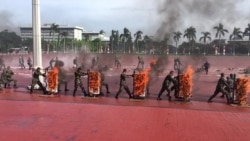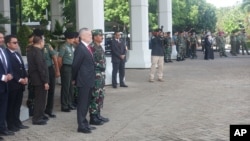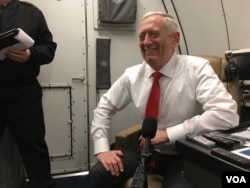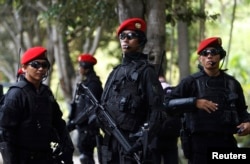Pentagon chief Jim Mattis would like to boost U.S. cooperation with Indonesia’s military. Now he has a better idea of what they can do.
Indonesian special forces put on an elaborate counterterrorism demonstration for the visiting U.S. defense secretary in Jakarta Wednesday – although that’s an understatement.
There were shirtless strong men with war-painted faces breaking stacks of flaming bricks with their heads. Teams of commandos beheading snakes with their mouths and drinking their blood. And a trio of German Shepherd dogs descending from helicopters to defeat a hostage-wielding "terrorist" while the theme from "Mission Impossible" played in the background.
Mattis, who observed the 20-minute demonstration alongside a senior Indonesian military official at the country’s armed forces headquarters, appeared to enjoy the show.
"Me and the snakes," Mattis joked afterwards with reporters. "When you watch a force do that many small things perfectly, you can imagine that they can also put the bigger issues together."
"Even the dogs coming out of the helicopters knew what to do," he added, laughing.
The big issues
Mattis’ visit aims to expand overall military cooperation with Indonesia, which is modernizing its military and - in addition to boosting counterterrorism cooperation - has shown an increased willingness to push back against China’s territorial claims in the South China Sea.
Indonesia is also dealing with the possible return of hundreds of its citizens who fought with the Islamic State group in Syria and Iraq. "We are out to expand in ways that respond to any requests from Indonesia on counterterrorism to include the special forces units," Mattis said Tuesday alongside Defense Minister Ryamizard Ryacudu.
Following those talks, Ryamizard said he would like Mattis to help relax the legal limitations on closer U.S. ties with Kopassus, an elite Indonesian special forces group that has faced restrictions stemming from a past record of abuses that include killings and torture, mostly in the 1990s.
While in Jakarta, Mattis has said he wants to expand counterterrorism cooperation with the Kopassus, noting that the group has since reformed.
"That was upwards of 20 years ago, and we’ll look at it since then," Mattis said after meeting with Indonesia’s president, defense minister, and other leaders.
"Under our rules, there are established procedures for rehabilitating a unit that has been alleged or has committed certain acts," Mattis said. "And we will go through the established procedures."
It is not immediately clear if Kopassus forces took part in Wednesday's demonstration.
Rights abuses
Kopassus’ alleged abuses include massacres in East Timor, the abduction and forced disappearance of student pro-democracy activists, and a torture campaign in Aceh during a now-ended insurgency. Rights groups say many of those responsible have not been held accountable.
Amid those concerns, the U.S. severed ties with Kopassus in 1999. In 2010, the Pentagon took initial steps toward reestablishing cooperation, but that has been limited and non-lethal, consisting of staff exchanges and low-level subject matter dialogue.
Mattis said he believes the now-reformed group would stand up to the scrutiny of the U.S.' Leahy Law, which prohibits Washington from providing military assistance to foreign security forces that violate human rights.
"Some Kopassus commanders have tried to do their jobs better," said Andreas Harsono, who focuses on Indonesia for Human Rights Watch.
In 2013, a Kopassus commander allowed 11 of his men to be tried and sentenced for invading a prison and killing some inmates, Harsono said. But, he said, there remain allegations that the group is still involved in unlawful spying activities in West Papua, the Indonesian half of New Guinea island.
"Kopassus still retain their abusive soldiers, including those involved in kidnapping students and convicted in killing civilians," he added.
Joseph Felter, the top U.S. defense official on Southeast Asia, said the Pentagon sees “real value and potential in working with Kopassus as a partner in counterterrorism,” if the State Department were to loosen restrictions.
"They are a very, very effective counterterrorism unit," Felter said.
The U.S. already has very close ties with the Indonesian military. Since 2013, Felter said the U.S. has sold over $1.5 billion to Indonesia under the foreign military sales program, including the Apache helicopter and the F-16. And Jakarta is considering buying more F-16s, he added.
"Any time we can help a partner uphold a free and fair rules-based order in a free and open Indo-Pacific, that’s what we’re here for," Felter said.
Vietnam
Mattis on Wednesday landed in Vietnam, where China is a major focus.
The Pentagon last week unveiled a new National Defense Strategy that prioritizes the U.S. geopolitical rivalry with China and Russia.
Vietnam is one of the most vocal opponents of China’s expansive maritime claims and has clashed at times with Chinese ships in the area.
China claims nearly the entire South China Sea, ignoring the claims of many of its neighbors.
The U.S. says it does not take a position on the territorial disputes, but wants freedom of navigation in the region and has at times blamed Chinese actions for raising tensions.
"(Vietnam) does have one of the region’s fastest growing economies, and so freedom of navigation and access in the South China Sea will be critical to them economically and of course in their security efforts," Mattis said.








